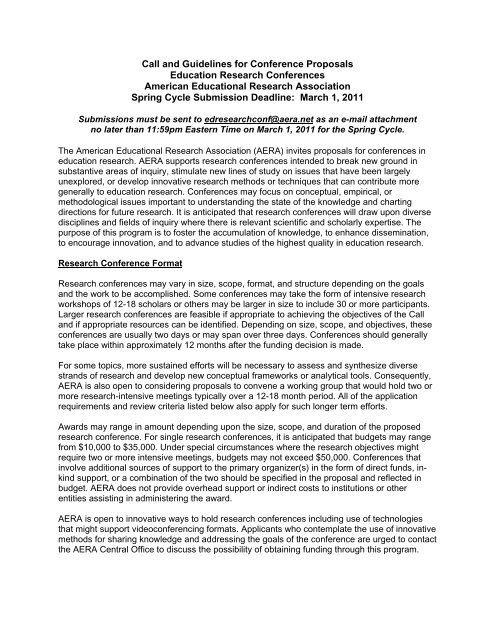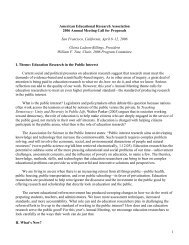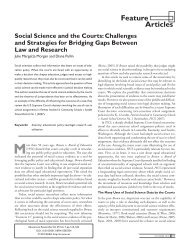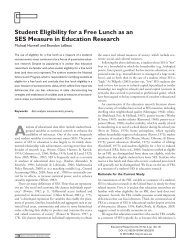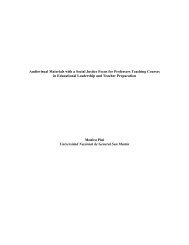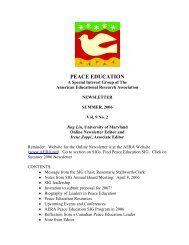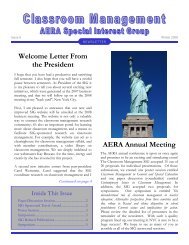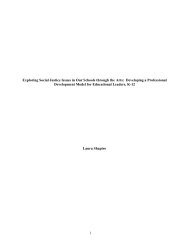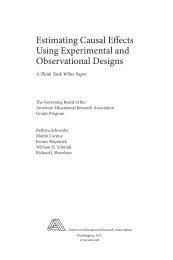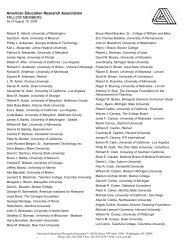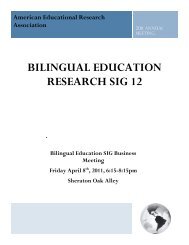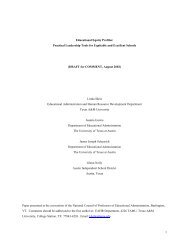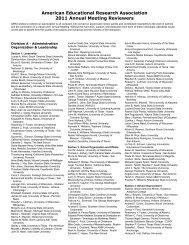Call and Guidelines for Conference Proposals ... - AERA website
Call and Guidelines for Conference Proposals ... - AERA website
Call and Guidelines for Conference Proposals ... - AERA website
Create successful ePaper yourself
Turn your PDF publications into a flip-book with our unique Google optimized e-Paper software.
<strong>Call</strong> <strong>and</strong> <strong>Guidelines</strong> <strong>for</strong> <strong>Conference</strong> <strong>Proposals</strong><br />
Education Research <strong>Conference</strong>s<br />
American Educational Research Association<br />
Spring Cycle Submission Deadline: March 1, 2011<br />
Submissions must be sent to edresearchconf@aera.net as an e-mail attachment<br />
no later than 11:59pm Eastern Time on March 1, 2011 <strong>for</strong> the Spring Cycle.<br />
The American Educational Research Association (<strong>AERA</strong>) invites proposals <strong>for</strong> conferences in<br />
education research. <strong>AERA</strong> supports research conferences intended to break new ground in<br />
substantive areas of inquiry, stimulate new lines of study on issues that have been largely<br />
unexplored, or develop innovative research methods or techniques that can contribute more<br />
generally to education research. <strong>Conference</strong>s may focus on conceptual, empirical, or<br />
methodological issues important to underst<strong>and</strong>ing the state of the knowledge <strong>and</strong> charting<br />
directions <strong>for</strong> future research. It is anticipated that research conferences will draw upon diverse<br />
disciplines <strong>and</strong> fields of inquiry where there is relevant scientific <strong>and</strong> scholarly expertise. The<br />
purpose of this program is to foster the accumulation of knowledge, to enhance dissemination,<br />
to encourage innovation, <strong>and</strong> to advance studies of the highest quality in education research.<br />
Research <strong>Conference</strong> Format<br />
Research conferences may vary in size, scope, <strong>for</strong>mat, <strong>and</strong> structure depending on the goals<br />
<strong>and</strong> the work to be accomplished. Some conferences may take the <strong>for</strong>m of intensive research<br />
workshops of 12-18 scholars or others may be larger in size to include 30 or more participants.<br />
Larger research conferences are feasible if appropriate to achieving the objectives of the <strong>Call</strong><br />
<strong>and</strong> if appropriate resources can be identified. Depending on size, scope, <strong>and</strong> objectives, these<br />
conferences are usually two days or may span over three days. <strong>Conference</strong>s should generally<br />
take place within approximately 12 months after the funding decision is made.<br />
For some topics, more sustained ef<strong>for</strong>ts will be necessary to assess <strong>and</strong> synthesize diverse<br />
str<strong>and</strong>s of research <strong>and</strong> develop new conceptual frameworks or analytical tools. Consequently,<br />
<strong>AERA</strong> is also open to considering proposals to convene a working group that would hold two or<br />
more research-intensive meetings typically over a 12-18 month period. All of the application<br />
requirements <strong>and</strong> review criteria listed below also apply <strong>for</strong> such longer term ef<strong>for</strong>ts.<br />
Awards may range in amount depending upon the size, scope, <strong>and</strong> duration of the proposed<br />
research conference. For single research conferences, it is anticipated that budgets may range<br />
from $10,000 to $35,000. Under special circumstances where the research objectives might<br />
require two or more intensive meetings, budgets may not exceed $50,000. <strong>Conference</strong>s that<br />
involve additional sources of support to the primary organizer(s) in the <strong>for</strong>m of direct funds, inkind<br />
support, or a combination of the two should be specified in the proposal <strong>and</strong> reflected in<br />
budget. <strong>AERA</strong> does not provide overhead support or indirect costs to institutions or other<br />
entities assisting in administering the award.<br />
<strong>AERA</strong> is open to innovative ways to hold research conferences including use of technologies<br />
that might support videoconferencing <strong>for</strong>mats. Applicants who contemplate the use of innovative<br />
methods <strong>for</strong> sharing knowledge <strong>and</strong> addressing the goals of the conference are urged to contact<br />
the <strong>AERA</strong> Central Office to discuss the possibility of obtaining funding through this program.
Application Process<br />
The <strong>AERA</strong> Research Advisory Committee (RAC) considers proposals <strong>for</strong> research conferences.<br />
There are two application cycles each year. Submission must be sent as an e-mail attachment<br />
to edresearchconf@aera.net. For the spring cycle, the deadline is March 1, 2011. Applicants<br />
typically would be notified within three months of submission of a proposal.<br />
Eligibility Requirements <strong>for</strong> Research <strong>Conference</strong> <strong>Proposals</strong><br />
The eligibility requirements below must be met in order to submit a proposal.<br />
• The primary organizer or one of the primary organizers must be a member of <strong>AERA</strong>.<br />
• The primary organizer(s) must be affiliated with an academic institution, research<br />
institution, or other organization that will be responsible <strong>for</strong> administering the award.<br />
Joint proposals from cooperating institutions are appropriate.<br />
• <strong>Conference</strong>s may only be held in the United States or its possessions unless the primary<br />
organizer is an <strong>AERA</strong> member at an institution outside of the United States <strong>and</strong> it is<br />
appropriate <strong>and</strong> cost effective given the goals of the conference.<br />
• <strong>AERA</strong> Divisions or SIGs are eligible individually or in collaboration to submit a<br />
conference proposal. <strong>AERA</strong> entities seeking to submit proposals need to identify a<br />
primary organizer or organizer(s) to develop <strong>and</strong> submit the proposal. Under such<br />
circumstances, the primary organizers need to make clear that they are advancing the<br />
proposal on behalf of one or more Divisions or SIGs. Submission through a Division or<br />
SIG is an option but is not required.<br />
Review Criteria <strong>for</strong> Research <strong>Conference</strong> <strong>Proposals</strong><br />
The following criteria will be used in reviewing proposals.<br />
• The conference focuses on a significant research problem; the topic involves a new<br />
approach to an issue or area of research or shows the potential to advance research or<br />
break new ground.<br />
• The conference, including preparatory work, synthesizes <strong>and</strong> builds upon extant<br />
research or analyzes relevant studies or data with conceptual frameworks or analytic<br />
tools that show promise of yielding an advance.<br />
• The conference draws upon the range of disciplines or areas of inquiry that can<br />
contribute to substantial new advancements in ongoing research areas or to innovative<br />
study of new issues.<br />
• There is a well specified plan <strong>for</strong> constituting the conference, inviting or identifying<br />
participants, organizing <strong>and</strong> conducting the conference, <strong>and</strong> planning <strong>for</strong> a report or<br />
publishable quality product.<br />
• The structure <strong>and</strong> <strong>for</strong>mat of the conference (e.g., number of participants, advance<br />
preparation of papers or working memor<strong>and</strong>a, modes of presentation, working activities)<br />
engender confidence of a successful outcome.<br />
• The topic selected has not received adequate coverage at other research conferences<br />
<strong>and</strong> annual scholarly meetings.<br />
• A feasible budget <strong>and</strong> support plan are provided, including specification of any in-kind or<br />
direct support contributing to the resource needs of the conference (e.g., other grants,<br />
facilities at the primary organizer’s institution).<br />
• The primary organizer(s) have demonstrated experience in leading field development<br />
activities, such as reviewing or editing scholarly articles or chapters.<br />
2
• The conference <strong>and</strong> its outcomes <strong>and</strong> products will attract the interest of a scholarly<br />
audience from a broad range of areas <strong>and</strong> disciplines.<br />
• The conference will advance education research <strong>and</strong> promote the contributions of<br />
education research as a field.<br />
Research <strong>Conference</strong> Proposal Contents<br />
The in<strong>for</strong>mation listed below must be included <strong>and</strong> addressed as part of the proposal.<br />
• Cover page with title <strong>and</strong> probable date of conference, name of primary organizer or<br />
organizers, <strong>and</strong> the entity responsible <strong>for</strong> the administration <strong>and</strong> financial reporting on<br />
the grant<br />
• A 200-300 word abstract of the research conference<br />
• A proposal narrative of a maximum of five single-spaced pages (excluding the<br />
references <strong>and</strong> appendices) to include but not be limited to:<br />
In<strong>for</strong>mation on the probable location <strong>and</strong> approximate dates of the conference; the<br />
anticipated size <strong>and</strong> scope of the conference; the primary organizers <strong>and</strong> any<br />
planning committee to be involved; a statement of objectives; an overview of the<br />
research literatures, methodological or measurement issues, or data bases relevant<br />
to the objectives; consideration of the need <strong>for</strong> <strong>and</strong> potential benefits of such a<br />
conference; in<strong>for</strong>mation on any related meetings or activities on the same topic;<br />
in<strong>for</strong>mation on recruitment of participants <strong>and</strong> expectations of their participation;<br />
discussion of how the conference will be organized <strong>and</strong> conducted, how results or<br />
outcomes will be disseminated, <strong>and</strong> how it will contribute to the advancement or<br />
improvement of extant areas of inquiry or nascent or emerging areas. In addressing<br />
recruitment, the narrative should address the breadth <strong>and</strong> background of persons<br />
sought <strong>for</strong> the conference in relation to the conference objectives <strong>and</strong> the explicit<br />
emphasis on spanning diverse fields or disciplines of relevance to the topic. If<br />
specific individuals have already been invited, in<strong>for</strong>mation on these persons <strong>and</strong> their<br />
backgrounds can be included in an appendix. Also, if available, a draft agenda <strong>for</strong><br />
the conference can be included as an appendix.<br />
• Reference list <strong>for</strong> the research cited in the narrative (in addition to the maximum of five<br />
pages)<br />
• Detailed budget <strong>for</strong> the conference <strong>and</strong> the amount of support being requested of <strong>AERA</strong>.<br />
Budget notes can include in<strong>for</strong>mation on any relevant direct or in-kind contributions that<br />
may be provided <strong>for</strong> the conference by other sources, including the organizer’s<br />
institution.<br />
• Appendices <strong>for</strong> the proposal must include the curriculum vitae of the primary<br />
organizer(s), <strong>and</strong>, where appropriate, letters of support from affiliated institution(s) or<br />
entities, <strong>and</strong> any draft agenda <strong>for</strong> the conference.<br />
Reporting <strong>and</strong> Publication Requirements<br />
<strong>Conference</strong> Report<br />
A conference report <strong>and</strong> any background papers or presentation materials (including electronic<br />
presentations) must be submitted to the <strong>AERA</strong> Central Office within three months after the date<br />
the conference is held. The report <strong>and</strong> related materials are available <strong>for</strong> <strong>AERA</strong> dissemination<br />
3
on the <strong>AERA</strong> <strong>website</strong>, publication as a report, in an <strong>AERA</strong> paper repository, or by other means<br />
that may be appropriate.<br />
Scholarly Book Based on Research <strong>Conference</strong><br />
<strong>AERA</strong> retains the right of first refusal on any scholarly volumes that might result from the<br />
research conference. <strong>Proposals</strong> that plan <strong>for</strong> publishable quality books based on the conference<br />
are encouraged. Decisions on book publications rest with the Books Editorial Board. Divisions<br />
or SIGs sponsoring research conferences may not independently publish these volumes under<br />
their own imprimatur if the Board decides against publication, but the conference organizers<br />
may do so as independent scholars.<br />
If the primary organizer of the conference would like to consider producing a scholarly volume<br />
based on the conference, he or she would submit a <strong>for</strong>mal prospectus to the <strong>AERA</strong> Books<br />
Editorial Board. Each prospectus needs to contain a statement of purpose, a description of the<br />
audience, a listing of competing volumes, an annotated table of contents, <strong>and</strong> the proposed<br />
organizers/editors' vitas, as well as address other issues as specified in the <strong>AERA</strong> guidelines <strong>for</strong><br />
book proposals. If a research conference proposal is selected to receive an award, the primary<br />
organizer(s) will receive additional in<strong>for</strong>mation on submitting a <strong>for</strong>mal book prospectus.<br />
Review <strong>and</strong> Award<br />
As noted above, the <strong>AERA</strong> Research Advisory Committee reviews conference proposals <strong>and</strong><br />
makes final decisions on the awards. The Council <strong>and</strong> staff liaison(s) to the Research Advisory<br />
Committee will participate in the review, as well as one member of the Social Justice Action<br />
Committee appointed by the <strong>AERA</strong> President. Announcements of awards are made by the<br />
<strong>AERA</strong> Central Office based on the recommendation of the RAC. A staff member with a<br />
background in education research directs this program <strong>and</strong> also serves as staff liaison to the<br />
RAC <strong>for</strong> this activity.<br />
Prospective applicants are encouraged to consult with <strong>AERA</strong> staff <strong>for</strong> advice on the conference<br />
organization <strong>and</strong> application (e.g., <strong>for</strong>mats or budget allowances). Please direct questions to<br />
edresearchconf@aera.net <strong>and</strong> you will be contacted by e-mail or telephone.<br />
4


